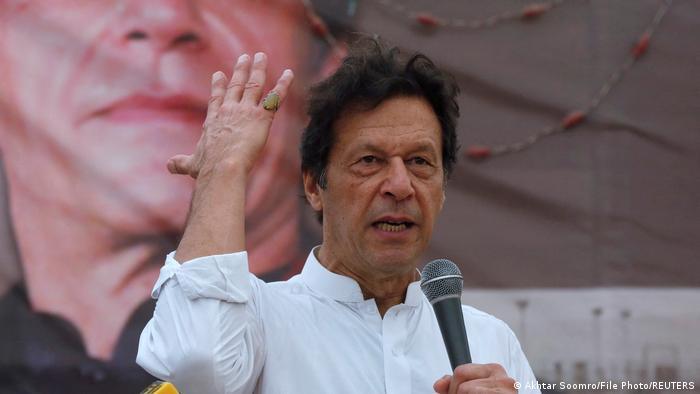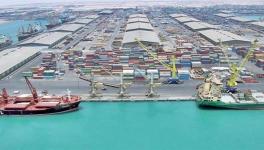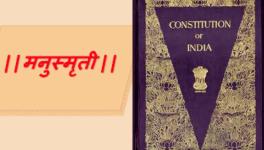Pakistan: How the Supreme Court Thwarted a 'Civilian Coup'

Khan is trying to turn the public against the opposition by accusing the West, say observers
Pakistan's Supreme Court on Thursday ruled that a move by Prime Minister Imran Khan to dissolve the country's Parliament and thus avoid a no-confidence vote was unconstitutional.
The court ordered that Pakistan's Parliament be restored and reconvene on April 9 in order to proceed with the no-confidence vote.
The court made its decision four days after Khan dissolved Parliament and called for early elections, triggering a political crisis.
The court ruled that the deputy speaker of Parliament, Khan ally Qasim Suri, was not within his rights to dissolve the legislature.
Last week, Khan lost his parliamentary majority, and was almost certain to be ousted after the opposition gained the necessary support for a no-confidence vote.
Suri threw out the motion for a vote, claiming that it was unconstitutional, and accused the opposition of colluding with the United States to remove Khan from power. The South Asian country had plunged into a constitutional crisis after the deputy speaker's actions.
The opposition alliance has hailed the Supreme Court ruling and said lawmakers would prove their majority in the lower house, the National Assembly, on Saturday.
"This is a defining moment for Pakistan and its constitution. We have the majority in Parliament, and we are ready to vote," Shahid Khaqan Abbasi, a former prime minister and member of the Pakistan Muslim League (Nawaz) party, told DW after the verdict.
A 'victory' for democracy
Pakistan's civil society and political observers have dubbed the Supreme Court ruling a victory for constitution and democracy.
"This ruling has delivered a major triumph for Pakistan's democracy and constitution, and understandably the opposition is delighted that it will now have a chance to take power," Michael Kugelman, a South Asia expert at the Washington-based Woodrow Wilson Center, told DW.
Osama Malik, a legal expert, believes that the Supreme Court has "blocked what was essentially a civilian coup."
"In a system where trichotomy of powers exist, when the executive branch attacks the legislature, it becomes the duty of the judiciary to protect the legislature. The judges have fulfilled that duty and provided support to Pakistan's nascent democracy," he said.
Kugelman said the opposition parties would not have an easy time forming a government.
"If Khan loses the no-confidence vote, he will be able to trot out a narrative of victimization, rooted in the idea that an international conspiracy removed him from power, and use this to rally his base and prepare for his next big political move," Kugelman said.
Foreign conspiracy claims
Khan's Pakistan Tehreek-e-Insaf (PTI) party claims that US Assistant Secretary of State for South and Central Asia Affairs Donald Lu had warned Pakistan's ambassador to the United States, Asad Majeed Khan, that there could be "dire consequences" should the prime minister remain in power.
The US has categorically denied interfering in Pakistan's domestic affairs, with a State Department spokesman saying: "There is no truth to these allegations."
Analysts say Khan is trying to turn the public against the opposition by accusing the West of interference.
Mosharraf Zaidi, a Pakistani political analyst, says: "The premier has clearly chosen an anti-West platform for the next elections."
Khan visited Moscow last month and held a meeting with President Vladimir Putin the same day Russia began its invasion of Ukraine. Since then, Khan has been presenting himself as an "anti-West" leader to his supporters, the one who has the guts to stand up against "imperialists."
Former Prime Minister Abbasi told DW that, after coming to power, the opposition alliance would investigate "the baseless" foreign conspiracy claim.
It is also possible that the new government would try Khan for violating the constitution, which, if proven, could end his political career.
Economic challenges
Analyst Kugelman said the opposition would inherit a terrible economic mess should the no-confidence vote succeed.
The political crisis has severely damaged Pakistan's economy.
On Thursday, the central bank increased its interest rate by 250 basis points — the biggest hike in years — to support the rupee, which has been falling in value against the US dollar during the economic crisis.
"The court's ruling sets Pakistan back on course toward having a functional government. This is a good signal for the markets that were jittery due to the uncertainty in recent days. But the road to stability is still a long one," Khurram Husain, an economic expert, told DW.
"The new government must quickly seek a resumption of the IMF program," he said.
Atika Rehman, a Pakistani journalist, said the challenges for the new government would be multipronged.
"Political instability will further plunge the economy into a downward spiral, and, with the prices of commodities already high as ever, there's a cause for public unrest. The situation is becoming untenable and requires both immediate and far-sighted action to give relief to members of the public," she said.
Edited by: Shamil Shams
Get the latest reports & analysis with people's perspective on Protests, movements & deep analytical videos, discussions of the current affairs in your Telegram app. Subscribe to NewsClick's Telegram channel & get Real-Time updates on stories, as they get published on our website.
























